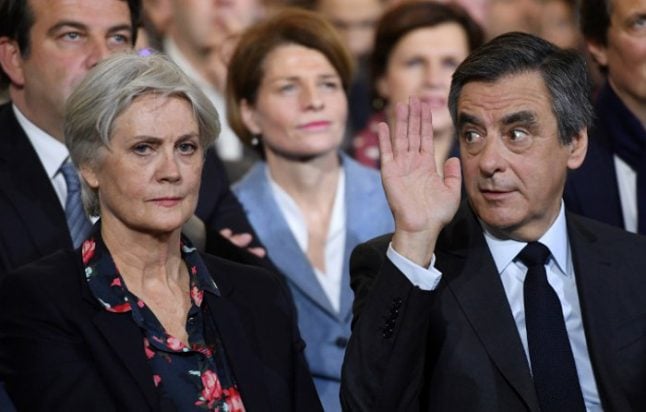“He was charged this morning. The hearing was brought forward so that it could take place in a calm manner,” his lawyer Antonin Levy told AFP.
Fillon was also charged with misuse of corporate assets, he said.
The candidate had already made it public in a heated press conference two weeks ago that he had been summoned by judges with a view to being charged.
Fillon has been fighting claims by Le Canard Enchainé newspaper that he used allowances to pay his British-born wife Penelope at least €680,000 ($720,000) over some 15 years as a parliamentary aide.
Although French lawmakers are allowed to employ family members, it is unclear what work Penelope actually did.
Lawyers for the couple said previously they were confident the investigators would find them “innocent, at last”.
The Canard Enchainé has also alleged Fillon's wife was also paid tens of thousands of euros by a literary review, the Revue des Deux Mondes, owned by her husband's billionaire friend, Marc Ladreit de Lacharriere.
Magistrates are investigating whether this amounted to misappropriation of corporate assets.
The probe also centres around the fact two of Fillon's children were paid as parliamentary advisors for brief periods.
The Fillons have argued that Penelope was legitimately employed and the couple's lawyers say they have provided proof of the work she did.
Despite the scandal hitting his opinion poll ratings Fillon has resisted pressure to step down both from the media and within his own party.
Scores of MPs from his Republicans party walked away from his campaign when it emerged two weeks ago that he was to be charged.
Many like his foreign affairs spokesman Bruno Le Maire were furious Fillon had initially said he would step down if mise en examen, the nearest French equivalent to being charged.
The candidate who enjoyed a handsome victory in the party's primary in November then changed tack, angrily denouncing the case as an attempted “political assassination”.
The charges do not mean Fillon will automatically face trial. Magistrates may eventually decide there is not a case to answer or not enough evidence to take to a trial.
Either way the probe is unlikely to be resolved before the French presidential election, the first round of which is on April 23rd.
A new poll on Tuesday showed Fillon had closed the gap on liberal Emmanuel Macron but still wouldn't make the second round run-off vote which would be between Macron and Le Pen.
But having fought on until now in a wildly unpredictable election no one is ready to rule Fillon out of the running, fake jobs scandal or not.




 Please whitelist us to continue reading.
Please whitelist us to continue reading.
Member comments